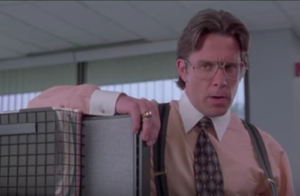Gary Cole’s Brilliant Lumbergh
It says something about me–the fact that I have a red Swingline stapler. I was a proselytizer where Office Space (1999) was concerned: My rec of the film was one of the ways I earned credibility with roommates and dates (the stapler itself was a parting gift from a convert). I even held viewing parties of the movie in grad school to remind peers that life could be worse: we could be in cubicles writing TPS reports.
So when asked to pick a favorite bad guy for this year’s villainathon, Gary Cole’s Bill Lumbergh seemed an obvious choice. The only surprise is that I needed someone (in this case, my sister, whose coworker gave her suspenders covered in flair) to remind me.

What I find so compelling about Cole’s performance is that he uses his attractiveness to add to the sleazy quality of his character. That sexy bedroom voice; that graceful, lounging pose are hilarious when employed to deliver directives rather than pick-up lines. Note how his arm rests on Peter’s cubicle, his slow, almost sensual movements with the coffee. Cole knows he’s sexy, and just how to use that sensuality to make us laugh.
Of course, Cole has always been a comedic gem, as Veep fans can attest. I fell for him in The Brady Bunch Movie (1995) and A Very Brady Sequel (1996), but others have been following him much longer. Despite the longevity and versatility of his career, he has little name recognition. Yet I would guess most comedy fans out there know the name Bill Lumbergh. Of what could have been a throwaway villainous role, Cole created THE example of corporate villainy–obsessed with minutiae, valuing bottom line above all, utterly impervious to human responses to his actions. When watching him, you have the feeling that the feds could be busting down the office doors in a raid, and Lumbergh would still calmly walk over to his employees’ desks, and ask about memos.
Consider his approach to Peter (Ron Livingston) at the start of the film. Lumbergh (Cole) greets him by asking what’s happening, with so little affect that Cole illustrates in two words how little management cares. His slow drawl of “yeah” is one of the most memorable lines in a quotable movie, largely because it means nothing at all. It’s simply a transition into the corporate speak he’s about to utter. (It is also such a favorite word of his that he even says it before “hi” on answering machine messages.) What I find hysterical about Lumbergh is the distance between the exaggerated words he uses (“special,” “terrific,” “great”) and Cole’s flat delivery. Even in Peter’s nightmares about Lumbergh sleeping with his girlfriend, his arch enemy is still uttering his favorite banalities in a near-monotone (“mmmkay?” is another favorite).
Lumbergh’s facial expressions are as funny as his words. Observe his gaze at the birthday cake prepared for him, as if he can’t wait for this attempt at office civility to end. His thanks, especially how “special” this celebration for him is, demonstrates the degree of his insincerity.
Cole relishes exaggerating just how awful this man is. (I think he particularly enjoyed that line about pesticide to Milton.) But why I find Lumbergh such a compelling villain is just how real he is, how perfectly he embodies the ugly side of American capitalism. Other villains are more theatrical, exciting, but they don’t scare me; they are so clearly fictional. But as we viewers watch Lumbergh, we think, I know this guy. He’s someone we’ve met. He’s someone we’ve worked with (but hopefully not under). He represents, as Peter claims, “all that is soulless and wrong.” And he’s not going away anytime soon.
This post is part of the Great Villain blogathon sponsored by Speakeasy, Shadows and Satin, and Silver Screenings. Go see some brilliant entries here.
